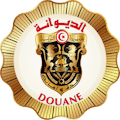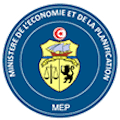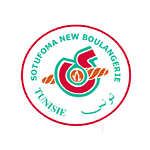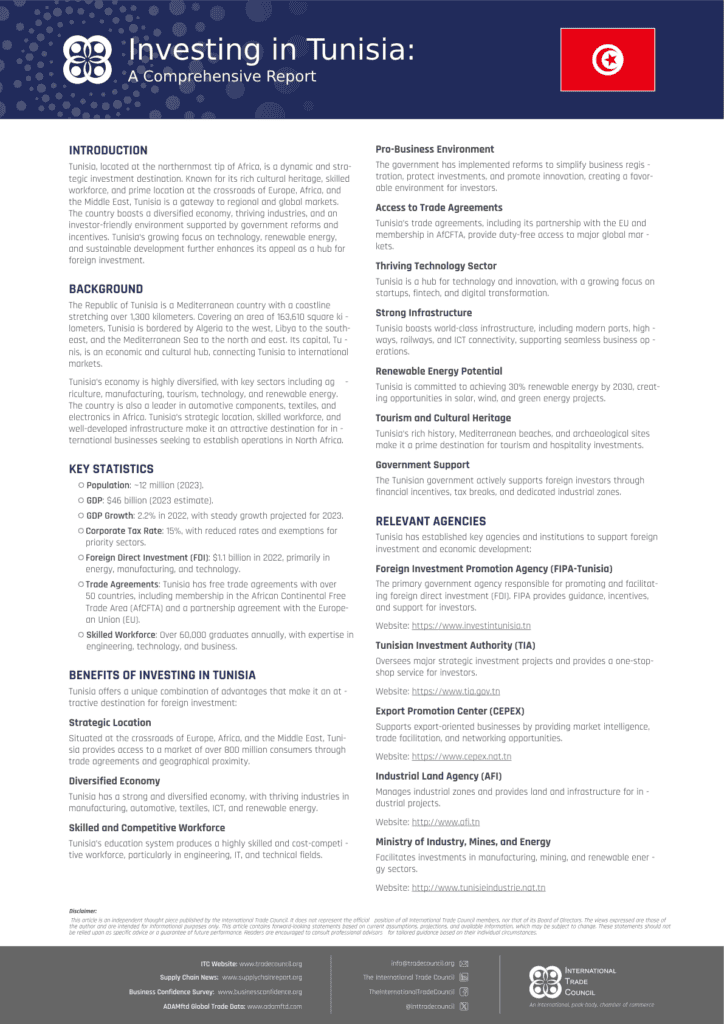- Type of Government: Parliamentary Republic
- Population: Approximately 12.4 million (2024 estimate)
- GDP: $50.7 billion USD (2023, nominal)
- Corporate Tax Rate: 15% (standard rate)
- Personal Income Tax Rate: Progressive, ranging from 0% to 35%
- Major Exports: Textiles, agricultural products (olive oil, dates), electrical machinery, mechanical appliances, phosphates, petroleum products
- Major Imports: Machinery, equipment, chemicals, hydrocarbons, foodstuffs, vehicles, textiles
Doing Business with Tunisia
A comprehensive guide to doing business, exporting, investing, and manufacturing in Tunisia.
Exporting to Tunisia offers opportunities for businesses across various sectors, including machinery, equipment, chemicals, foodstuffs, and more. However, to successfully export goods to Tunisia, you must follow a clear process involving compliance with local laws, documentation, and customs procedures. Below is a step-by-step guide to help you navigate the process.
1. Research the Tunisian Market
Before exporting, it’s crucial to conduct thorough research to understand the market demand, competition, and regulatory environment in Tunisia. Identifying potential partners, distributors, or customers is also important at this stage.
- How to Proceed:
- Identify the demand for your products in Tunisia through market research.
- Use trade data and reports from government and trade agencies to understand the import trends in Tunisia.
- Key Contact:
- Export.gov (U.S. Department of Commerce): https://www.trade.gov/tunisia-market-overview
2. Determine the Import Regulations and Tariffs
Tunisia has specific import regulations, including tariffs, duties, and licenses, that vary depending on the type of product you are exporting. Researching these regulations is essential to avoid any customs delays or penalties.
- How to Proceed:
- Check the tariff rates and import duties applicable to your products using the Harmonized System (HS) codes.
- Ensure your products comply with Tunisian standards and certifications, particularly for sensitive goods like foodstuffs, pharmaceuticals, electronics, and chemicals.
- Determine whether your product requires any import licenses or certifications from Tunisian authorities.
- Key Contact:
- Tunisian Customs (Douane Tunisienne): https://www.douane.gov.tn
3. Arrange Required Documentation
Exporting to Tunisia requires specific documentation to comply with customs regulations. Ensure you prepare and submit the necessary paperwork for your shipment.
- Key Documents Include:
- Commercial Invoice: A detailed invoice with information about the sale, including the buyer, seller, product description, quantity, and price.
- Packing List: A document listing the contents of the shipment.
- Certificate of Origin: A document certifying that the goods were produced in the exporting country.
- Bill of Lading or Airway Bill: A contract between the shipper and carrier detailing the shipment and terms of transportation.
- Import License (if applicable): Required for certain restricted goods.
- Health or Safety Certificates (if applicable): Required for food, pharmaceuticals, or other regulated products.
- How to Proceed:
- Work with your freight forwarder or customs broker to ensure all documents are in order.
- Confirm the certifications required for your specific industry or product.
4. Classify Your Goods and Determine Tariff Codes
Goods exported to Tunisia must be classified using the HS (Harmonized System) code, a standardized numerical method to classify traded products.
- How to Proceed:
- Identify the correct HS code for your product. This code determines the applicable tariff and duties.
- Use the WCO (World Customs Organization) website or consult with a customs broker to verify the HS code and tariff rates.
- Key Contact:
- World Customs Organization (WCO): http://www.wcoomd.org
- Tunisia Tariff Schedule: https://www.douane.gov.tn/fr/tarif-dedouanement
5. Comply with Tunisian Labeling and Packaging Requirements
For products exported to Tunisia, especially consumer goods (food, electronics, pharmaceuticals), compliance with labeling and packaging regulations is mandatory.
- How to Proceed:
- Ensure that your product labeling is in Arabic or French (the official languages in Tunisia).
- Include the necessary information on your labels, such as product name, ingredients, manufacturer details, expiration dates, and safety instructions.
6. Select a Shipping Method and Ensure Proper Transport
Choosing the right shipping method is crucial. Tunisia has several well-equipped international ports, such as Port of Radés and Port of Sfax.
- How to Proceed:
- Decide whether to ship by sea, air, or land, based on the type of goods and delivery timelines.
- Work with a reputable freight forwarder and arrange insurance for your shipment.
- Key Contact:
- Tunisian Ports Authority (Office de la Marine Marchande et des Ports – OMMP): https://www.ommp.nat.tn
7. Customs Clearance in Tunisia
Once the goods arrive in Tunisia, they must go through customs clearance. This process involves submitting the necessary documents and paying any duties or taxes.
- How to Proceed:
- Your customs broker will submit the required documents to Tunisian Customs.
- Ensure that all tariffs, duties, and VAT have been paid.
- Key Contact:
- Tunisian Customs (Douane Tunisienne): https://www.douane.gov.tn
8. Handling Duties, Taxes, and VAT
Tunisia imposes import duties, excise taxes, and VAT. The VAT rate in Tunisia is typically 19%.
- How to Proceed:
- Verify the duty rates for your product based on the HS code.
- Calculate the VAT and ensure they are paid during customs clearance.
9. Engage Local Partners or Distributors
To successfully navigate the Tunisian market, it’s advisable to work with a local distributor, importer, or business partner.
- How to Proceed:
- Identify and vet local partners who are familiar with your industry.
- Key Contact:
- Tunisian-American Chamber of Commerce (TACC): https://www.tunisianamerican.com
10. Stay Updated on Trade Regulations
Regulations regarding trade and customs can change, so it’s important to stay informed about any updates to import regulations or tariff changes.
- How to Proceed:
- Regularly check updates from Tunisian Customs and relevant trade agencies.
- Key Contact:
- Tunisian Ministry of Trade and Export Development: http://www.commerce.gov.tn
Key Government Contacts for Exporting to Tunisia
- Tunisian Customs (Douane Tunisienne)
Website: https://www.douane.gov.tn - Tunisian Ministry of Trade and Export Development
Website: http://www.commerce.gov.tn - Investment and Export Promotion Agency (FIPA Tunisia)
Website: http://www.investintunisia.tn
Importing goods into Tunisia requires compliance with local regulations, obtaining the necessary documentation, and adhering to customs procedures.
1. Obtain an Importer’s Registration
Before importing, businesses must be registered as importers with the Tunisian Ministry of Trade.
- How to Proceed:
- Apply for an importer’s registration number (Numéro d’Identification Fiscale, NIF) through the Tunisian Tax Office.
- Register your business with the Trade Register (Registre de Commerce).
- Key Contact:
- Ministry of Trade and Export Development: http://www.commerce.gov.tn
- Tunisian Tax Office (Direction Générale des Impôts): http://www.impots.finances.gov.tn
2. Determine the Product Classification and Import Regulations
Each product must be classified using the Harmonized System (HS) code.
- How to Proceed:
- Use the HS code to verify the import duties, taxes, and any restrictions on your product.
- Key Contact:
- Tunisian Customs (Douane Tunisienne): https://www.douane.gov.tn
3. Obtain Necessary Import Licenses or Authorizations
Certain goods require import licenses or authorizations from relevant Tunisian authorities.
- How to Proceed:
- Verify with Tunisian Customs whether your goods require an import license.
- Apply for licenses from the Ministry of Health, Ministry of Agriculture, or Ministry of Industry.
4. Prepare Required Documentation
- Required Documents Include: Commercial Invoice, Bill of Lading, Packing List, Certificate of Origin, and Health and Safety Certificates (if applicable).
5. Ensure Compliance with Labeling and Packaging Requirements
Imported goods must comply with Tunisian labeling regulations in Arabic or French.
- Key Contact:
- National Institute for Standardization and Industrial Property (INNORPI): http://www.innorpi.tn
6. Customs Clearance and Taxes
Once the goods arrive in Tunisia, they must go through customs clearance. Pay the import duties and VAT (typically 19%).
- Key Contact:
- Tunisian Customs (Douane Tunisienne): https://www.douane.gov.tn
Key Government Contacts and Resources
- Tunisian Customs (Douane Tunisienne): https://www.douane.gov.tn
- Ministry of Trade and Export Development: http://www.commerce.gov.tn
- Tunisian Tax Office (Direction Générale des Impôts): http://www.impots.finances.gov.tn
Incorporating a company in Tunisia involves several legal and administrative steps, including selecting the right business structure and registering with government authorities.
1. Choose the Business Structure
The most common types in Tunisia are:
- Limited Liability Company (SARL): Most common for SMEs. Minimum two shareholders.
- Joint Stock Company (SA): Suitable for larger businesses. Minimum seven shareholders.
- Single-shareholder LLC (SUPRL).
2. Register with the National Register of Enterprises (RNE)
You must submit an application to the RNE to legally incorporate your company.
- Key Contact:
- National Register of Enterprises (RNE): https://www.registre-entreprises.tn
3. Register for Tax and Obtain a TIN
After registration, the company must obtain a Tax Identification Number (TIF) from the Tunisian Tax Office.
- Key Contact:
- Tunisian Tax Office (Direction Générale des Impôts): http://www.impots.finances.gov.tn
4. Register for Social Security
Register your company and employees with the National Social Security Fund (CNSS).
- Key Contact:
- National Social Security Fund (CNSS): http://www.cnss.tn
Key Government Contacts for Incorporating a Business in Tunisia
- Investment and Export Promotion Agency (FIPA Tunisia): http://www.investintunisia.tn
- National Register of Enterprises (RNE): https://www.registre-entreprises.tn
- Tunisian Tax Office (Direction Générale des Impôts): http://www.impots.finances.gov.tn
Setting up a manufacturing plant in Tunisia offers a strategic opportunity due to its proximity to Europe. Below is a guide to the process.
1. Identify the Right Legal Structure
Choose between SARL, SA, or SUPRL and incorporate the company through the National Register of Enterprises (RNE).
2. Select a Suitable Location
Research industrial zones that offer infrastructure and incentives.
- Key Contact:
- Agency for the Promotion of Industry and Innovation (APII): http://www.tunisieindustrie.nat.tn
3. Obtain Necessary Permits and Licenses
Apply for construction permits through the local municipality and environmental approval from the National Agency for Environmental Protection (ANPE).
- Key Contact:
- National Agency for Environmental Protection (ANPE): http://www.anpe.nat.tn
4. Secure Financing and Incentives
Explore incentives from the Investment and Export Promotion Agency (FIPA).
5. Install Utilities and Hire Labor
Contact STEG for electricity and SONEDE for water. Recruit through ANETI.
- Key Contact:
- National Agency for Employment and Self-Employment (ANETI): http://www.emploi.nat.tn
Key Government Contacts and Resources
- Agency for the Promotion of Industry and Innovation (APII): http://www.tunisieindustrie.nat.tn
- National Agency for Environmental Protection (ANPE): http://www.anpe.nat.tn
- Tunisian Electricity and Gas Company (STEG): http://www.steg.com.tn
Registering a trademark in Tunisia grants legal protection to your brand. Tunisia is a member of WIPO.
1. Conduct a Preliminary Trademark Search
Ensure your desired trademark is available through the INNORPI database.
- Key Contact:
- INNORPI: http://www.innorpi.tn
2. File the Trademark Application with INNORPI
Submit the application form, representation of the trademark, and description of goods/services.
- Address: 8, Rue de Syrie, 1002 Tunis Belvédère, Tunisia
3. Examination and Publication
INNORPI will conduct an examination. If approved, it is published in the Official Bulletin of Industrial Property for a 2-month opposition period.
4. Issuance of Certificate
If no oppositions are filed, a Certificate of Trademark Registration is issued, valid for 10 years.
Key Government Contacts and Resources
- National Institute for Standardization and Industrial Property (INNORPI): http://www.innorpi.tn
- Official Journal of the Republic of Tunisia (JORT): http://www.iort.gov.tn
Resolving commercial disputes in Tunisia involves negotiation, mediation, arbitration, or litigation in commercial courts.
1. Attempt Negotiation and Mediation
Amicable settlement is the least costly. You can use the Tunis Mediation Centre (CMAT).
- Key Contact:
- Tunis Mediation Centre (CMAT): http://www.cmatunis.org
2. Consider Arbitration
A formal process where an arbitrator makes a binding decision.
- Key Contact:
- Arbitration and Mediation Centre of the Tunisian Chamber of Commerce (CCI): http://www.cci.tn
3. File a Lawsuit in Tunisian Commercial Courts
If ADR fails, you can pursue legal action.
- Key Contact:
- Commercial Court of Tunis: http://www.e-justice.tn
Key Government Contacts and Resources
- Tunis Mediation Centre (CMAT): http://www.cmatunis.org
- Ministry of Justice (Ministère de la Justice): http://www.e-justice.tn
1. Social and Cultural Factors
- Language: Arabic is official, but French is widely used in business.
- Business Etiquette: Personal relationships and trust are highly valued. Face-to-face meetings are preferred.
- Working Hours: Monday to Friday. During Ramadan, hours are reduced.
2. Political and Economic Stability
Tunisia has a stable multi-party system. The government encourages foreign investment through agencies like FIPA, especially for export-oriented businesses.
3. Foreign Exchange and Currency
The currency is the Tunisian Dinar (TND). Profits can be repatriated, but require approval from the Central Bank of Tunisia (BCT).
4. Legal and Regulatory Environment
Based on civil law. Contracts are governed by the Commercial Code. Intellectual property is protected through INNORPI.
5. Taxation
- Corporate Tax: Standard rate 15%.
- VAT: Rates range from 7% to 19%.
6. Infrastructure
Well-developed ports (Tunis, Sfax, Rades) and international airports (Tunis-Carthage).
Key Resources
- Central Bank of Tunisia (BCT): http://www.bct.gov.tn
- Foreign Investment Promotion Agency (FIPA): http://www.investintunisia.tn
Ask our Experts on Doing Business in/with Tunisia
If you’re looking to do business or invest in Tunisia, we can provide expert guidance, market insights, and valuable connections to help you navigate the local landscape. Contact us today to discover how we can assist in making your venture a success.










